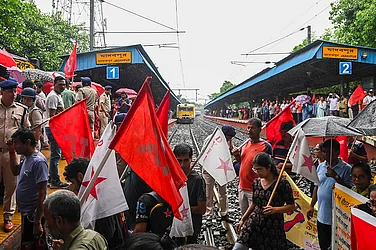The ambitious and strategic all-weather Zojila Tunnel, connecting the Kashmir Valley with Ladakh, is likely going to face delay in its completion despite the Bharatiya Janata Party (BJP)-led government’s efforts to ensure its timely completion, Outlook has learnt.
Sources told the Outlook that the delay in the completion of the Zojila Tunnel is largely due to the difficult terrain and harsh climatic conditions in the area where the project is being carried out. They added the project will be operational in “raw form” from March 2025. The deadline for the completion of full-fledged project was first set to December 2026.
However, the sources said the project is likely going to face a delay of one year due to the “extreme conditions prevalent” in the area
“There is going to be a delay. You can call it delay due to nature. There is going to be delay of at least one year. The project will be then dedicated to the nation,” a source told Outlook.
However, it’s understood that Union Minister of Road Transport and Highways Nitin Gadkari could inaugurate a 6.5 km stretch of the tunnel on the Srinagar-Leh National Highway on Monday, connecting Gagangir and Sonamarg. Gadkari will be visiting Kashmir for two days along with a parliamentary delegation, which also includes Lok Sabha Speaker Om Birla.
Officials confident of project timeline
The Zojila Tunnel project head Harpal Singh of Hyderabad-based Megha Engineering and Infrastructures Ltd (MEIL), the company involved in the construction of the tunnel, is, however, confident that it would be completed to time. He admitted though that they had faced a setback in winter after the avalanche had struck the project site.
On January 12, the work on the tunnel was suspended after a massive avalanche had struck the project site. Two workers belonging to Jammu and Kashmir’s Rajouri were killed and 38 pieces of building equipment —mostly heavy machinery— were also lost to damage.
Singh said they have restored the work on the project despite weather vagaries.
“We have again started underground tunnelling from last month while open work will be streamlined in 10-15 days,” said Singh.
Singh is also emotional about loss of two men in the project work. He calls both of them “martyrs”. He said, “They have laid down their lives for such an importance project of national strategic importance.”
Meanwhile, the officials said Gadkari along with Lok Sabha Speaker Om Birla and a group of 12 to 14 MPs of Parliamentary Consultative Committee attached to the Ministry of Road Transport and Highways will visit the project site on Monday and will review the project’s progress. It’s also understood that Gadkari could inaugurate the 6.5 km Gagangir-Sonamarg stretch of the tunnel.
Read all about Zojila Tunnel project
The total length of the Zojila Tunnel is 31 kms. It is divided in two parts. Part 1 constitutes area from Sonamarg to Baltal, which is also known as Amarnath Yatra route. It is an 18-km stretch with four bridges and five km of tunnelling. There is also one cut and cover structure of 2.4 kms in avalanche-prone area.
Part 2 of the project constitutes the main tunnel from Baltal to Minamarg in Drass Ladakh. The stretch will be likely completed in March-April 2025, as per officials. They said the stretch will be a kind of “raw” and not a complete one.
Officials, however, said the “raw tunnel” will be made available to security service personnel in time of emergency or in case of other crisis during winter months, especially when Zojila Pass is closed due to heavy accumulation of snow. During that period, the “raw tunnel” will provide a kind of temporary link between Kashmir Valley and Ladakh.
“The people can bypass treacherous Zojila mountain during that period,” said an official, insisting not to be identified.
Challenges in the project
The most challenging part of the project has been Part 2 between Baltal and Minamarg in Ladakh’s Drass. The 13-km stretch has been a “nightmare” for the engineers and workers, the officials said. They blame high altitude area and extreme weather conditions as main hurdles in the completion of the project.
“You see, we have got Baltal which is 3,000 meters above sea and Minamarg which is 3,300 meters above sea level. Then there are winter months from October to March when mercury plummets to –27*C. Even during day, we sometimes get temperatures around – 10*C. This makes work challenging,” said officials.
Strategic importance of Zojila Tunnel
The Zojila Tunnel Project assumes geostrategic significance especially in wake of China’s heavy-handed approach along the Line of Actual Control (LAC) in Eastern Ladakh.
During winters, when Ladakh gets cut off from the rest of country due to accumulation of snow on Zojila Pass at an altitude of 11,649 feet, the only way to reach the region is via air, which hinders smooth supply of essentials for not only local people, but also security forces deployed along the border in Ladakh.
The tunnel under construction is 9.5 metre wide, 7.57 metre high, and 13.145 km long. It’s in a horseshoe-shaped single-tube shape with two-lane road which passes under the Zojila Pass in the Himalayas between Ganderbal in Kashmir and Drass town in Kargil district of Ladakh.
The project comprises of smart tunnel system, constructed using the new Austrian tunnelling method and is equipped with CCTV cameras, radio control, uninterrupted power supply, and ventilation.
The project consists of two small tunnels Nilgrar 1 and Nilgrar 2 which are already complete by now.
In the Zojila tunnel, out of 13.145 kms, 5.832 km of tunnel excavation has already been completed. Moreover, the construction of three vertical ventilation shafts is also as per schedule and is moving smoothly.


























